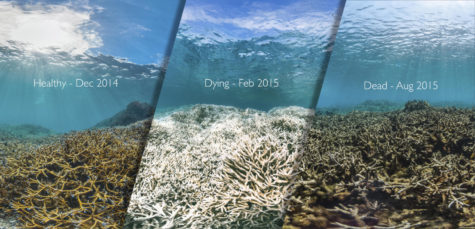Our Coral Reefs are Dying!
January 10, 2018
Coral reefs may only take up a small 1% of the world, but their existence is essential for nearly 25% of all marine animals in the ocean. Unfortunately, within the last 30 years our earth has lost over 50% of its coral reefs. This rapid decrease in coral reefs is due to the rapid increase of the earth’s ocean temperatures. This phenomenon is called “global warming” or “climate change.” As fossil fuels (coal and gas) are burned, carbon dioxide (CO2) is emitted and trapped into the atmosphere. However, nearly 93% of the heat trapped in our atmosphere goes straight into the ocean. This extra heat in the ocean is detrimental to marine life, especially coral reefs.
Coral reefs are extremely sensitive to heat, and when exposed to too much, they die off. Just a two degree increase in ocean temperatures is all that it takes for coral reefs to perish. When coral reefs are dying, they undergo a process called “coral bleaching,” which is the reef’s stress response to excessive heat in the ocean. Coral reefs turn a bright white as a result of coral bleaching to indicate that they are dying. After this stage, they turn completely brown to indicate their death. Some reefs produce a protective “sunscreen” by floressing their colors to try and save themselves from the intense heat.
At the rate earth’s temperatures are increasing, all coral reefs are said to die off completely within the next 25 years. Coral reefs are an essential part of the ocean because they provide food and shelter for many marine animals. They are also beneficial to the lives of roughly 500 million people. Coral reefs around the world serve as a resource of income and food because they are so abundant in marine life. According to the movie Chasing Coral, scientists and doctors have created a medicine made from coral reefs that has helped cure people from cancer. Coral reefs have protected coastlines from harsh tropical storms, and they assist in carbon and nitrogen fixing.
If we lose our coral reefs, we will lose an essential resource to our well being, economy, and environment. There are ways that we can help protect our coral reefs from dying off so soon. For example, we can conserve water; the less water we use, the less runoff and wastewater will pollute our oceans. We can also reduce our fossil fuel emissions by walking, biking, or utilizing public transportation. Most importantly, we must raise awareness about climate change and inspire the people in our community to take action. We cannot lose a whole ecosystem in just 25 years, we must take immediate action to make a difference.
All information is from the movie Chasing Coral. Find it on Netflix to watch the devastating effects of climate change.

Before and After of Coral Reef






